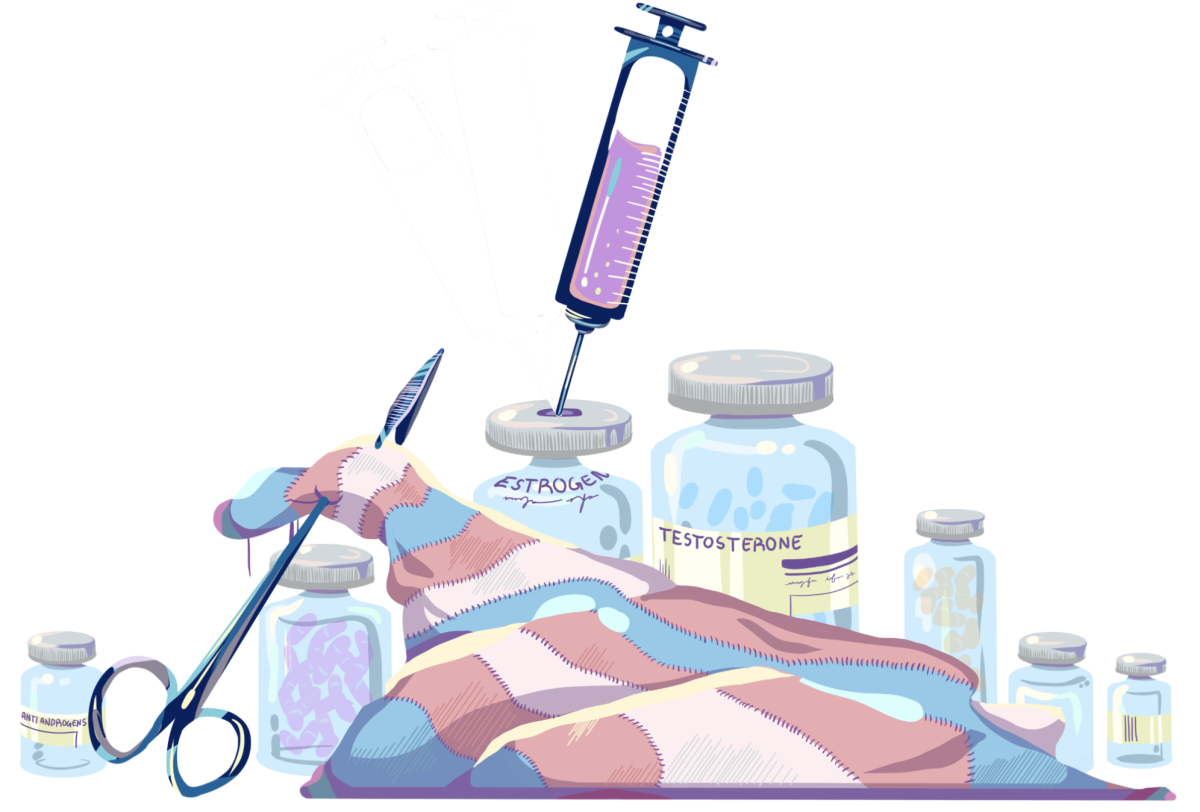As Loklin Gertschen-Klaseus ’25 relaxed under the anesthesia, he turned to inspect the IV line in his right arm and gazed at the lights flickering above him, his heart fluttering with anticipation and nervousness. Scheduled to undergo a life-changing medical procedure, Gertschen-Klaseus said he was thrilled to start a new chapter of his life.
“I remember I was so excited going into the surgery,” Gertschen-Klaseus said. “I was so ready. It was something I’d wanted to get done in a long time and it was finally happening.”
Gertschen-Klaseus emerged from the operating room ten hours later with a successful chest reduction surgery. He said he thought about undergoing this procedure for a while since coming out as transgender.
“I had always been considering [surgery] because it was an insecurity of mine,” Gertschen-Klaseus said. “A lot of my friends told me it just looked like I had [gynecomastia] which a lot of people get during puberty, but it still made me feel insecure. I talked with my parents when I turned 14, [but the insurance] said I had to wait until I was 16. zthat’s when I did it.”
Gertschen-Klaseus said he was grateful for his parents’ unwavering encouragement and confidence in his own judgement.
“They’ve always been very supportive from the moment I came out,” Gertschen-Klaseus said. “They know me, and they know how sure I am about everything. I’ve been out as transgender for six years, so it’s obviously not just a phase. I’d say it makes sense that other parents are nervous because their kids aren’t as sure. Still, my parents gave me free rein. To me, that’s better than telling a kid they can’t do it at all. I’d rather regret it on my own volition.”
Transgender minors can receive gender-affirming care in a number of forms, according to WebMD. The most common treatment is for patients to receive puberty-halting medications, known as GnRH agonists. These drugs, which have not been approved by the U.S. Food and Drug Administration (FDA) for gender dysphoria, suppress sex hormones — testosterone for those who are assigned male at birth and estrogen for those who are assigned female at birth. Then, minors have the option to continue pursuing hormone treatments, a process in which hormones are taken to initiate a puberty that matches the minor’s gender identity. A study conducted by Komodo Health TM reported 1,390 patients aged six to 17 in the U.S. have started puberty blocker treatment, and 4,231 patients have started hormone treatment after a gender dysphoria diagnosis.
Gertschen-Klaseus said he had been on puberty blockers and testosterone for six years before committing to surgery.
“I came out as transgender when I was ten, and I met a doctor after that,” Gertschen-Klaseus said. “I went on puberty blockers when I was 11, and then we started talking about testosterone. At 13, they put me on a very low dose of testosterone for a few months and, finally, a year and a half later, they put me on full injections for two years.”
The ultimate step for a patient to take in gender-affirming care is surgery. 42-54% of transgender men have surgery done while only 28% of transgender women undergo surgery, according to the Translational Andrology and Urology (TAU) Journal. Gertschen-Klaseus joins a growing population of transgender and nonbinary (TGNB) minors performing gender-affirming surgeries (GAS). GAS nearly tripled from 2016 to 2019, and patients aged 12 to 18 make up 7.7% of that population, according to a study conducted by the Journal of American Medical Association (JAMA) Surgery Network Open.
Gertschen-Klaseus said he was transparent about his transgender identity but strayed from discussing his surgery due to uncertainties surrounding laws on gender-affirming surgeries.
“I’m pretty open about my transgender identity,” Gertschen-Klaseus said. “But [for the surgery], it is possible for me to get backlash, just because the laws right now are very shaky on whether or not minors should even be taking hormones. So if I meet someone, I usually don’t go into as much detail, though it’s pretty clear that I’m on testosterone, and they can assume things. But everybody close to me has been very supportive, so I’ve been open with them.”
Tristen* is a student who recently underwent a gender-affirming surgery at 17. He said he was hesitant to be open about the procedure after witnessing his relatives’ uncomfortable responses to news about his surgery.
“When I first came out of surgery, I was really eager to tell my relatives and friends about it,” Tristen said. “Though everyone was nice about it, I definitely think they were uncomfortable with the idea that a 17-year-old had surgery done, especially since gender-affirming surgeries are such invasive procedures. It became almost a taboo topic, so I just stopped talking about it.”
There have been an increasing number of legal bans on gender-affirming care in recent years. A record-breaking 491 anti-LGBTQ bills have been introduced into state legislatures in 2023 so far, 63 of which have been signed into law, according to the American Civil Liberties Union. Many of these laws attempt to criminalize access to gender-affirming treatments for transgender minors by prosecuting medical providers and parents who consent to these procedures. Currently, 20 states have bans against gender-affirming care in some form.
Upper School DEI Coordinator and Student Leaders for Inclusion, Diversity and Equity (SLIDE) instructor Reb Limerick said she felt students were heavily affected by the political climate surrounding LGBTQI+ communities.
“I’ve talked to a transgender student last year who talked about how [these laws] have impacted the college process,” Limerick said. “They were talking about how there were only a limited number of states that they felt comfortable applying to because of the legislation happening in other states, [which] limited their options of safe spaces. In general, when injustice happens in the news or outside of Harvard-Westlake, it still emotionally impacts so many students at our school.”
Gertschen-Klaseus said though he understands these lawmakers’ stance, he hopes that more people will learn to trust medical experts to make individual decisions for their patients.
“If I wasn’t able to do [the surgery], I’d be very upset,” Gertschen-Klaseus said. “But I get people being uncomfortable with somebody who is not a legal adult being able to make these decisions for themselves because these are permanent decisions. But I also think that people need to rely on the doctors more because they can analyze the kids and see if, for example, [it] is just a phase or [if the] kid is suffering from gender dysphoria and is going to transition and live their life out. There are experts in this field, and people need to trust their opinions more. It has to be on a case-by-case basis because it’s a complicated thing.”
In an effort to raise awareness and create a safe environment on campus, the school has implemented Safe Space training for faculty and staff. Created by science teacher Nathan Cardin, Limerick said the training helps adults on campus to guide students in the LGBTQI+ community.
“The Safe Space training offers an opportunity for faculty and staff to learn how to create a safe space for LGBTQI+ students within your classroom, your team or whatever group of students that you lead, depending on your role here,” Limerick said. “It changes every year depending on needs. It started off as a way to talk about general education on the LGBTQI+ community, but then, as time has gone on, we’ve made it more specific. Anti-trans legislation has been a topic of conversation recently.”
In 2021, Arkansas lawmakers passed the Save Adolescence Frome Experimentation (SAFE) Act, the nation’s first ban on gender-affirming care for minors, stating that forms of gender-affirming care were experimental and could harm minors’ welfare. In June 2023, this was struck down as evidence had shown that mental health in transgender minors has improved as a result of gender-affirming care. Indeed, gender-affirming surgeries can lead to a 42% reduction in psychological distress, according to the JAMA Surgery Network.
Limerick said they hope that students who have received gender-affirming surgeries can feel supported and welcome in the school community.
“I want all of our transgender and gender-nonconforming students to feel like they can be their full selves at school, that they can transition or be fluid with their gender, and be affirmed and accepted at every stage of the process,” Limerick said. “I want them to feel like they can be their expansive selves while they’re on campus in classes and being part of their co-curricular activities. Gender-affirming surgery can be life-saving.”
Tristen said he felt the surgery substantially improved his mental health and sense of identity.
“Honestly, this surgery was for myself more than anything else,” Tristen said. “I used to get a lot of anxiety over how my chest looked, and [I was] in a weird position where I felt I wasn’t female because of my identity but not fully male either because of my physical body. Now I can look at myself in the mirror or go to the men’s section at clothing stores feeling like I am where I was supposed to be.”
Likewise, Gertschen-Klaseus said that he felt his perception of himself had improved substantially after receiving the surgery.
“For a long time I felt very in between because I didn’t have a fully developed chest,” Gertschen-Klaseus said. “I was transgender, and that made it worse for me. Especially if I was shirtless [because] I would only be shirtless around my close friends and family, and at the pool, I would always wear a rash guard. Once I’m fully healed, I’d be more comfortable taking my shirt off. [The surgery] definitely made me feel more confident [and] more at ease with myself.”
*Name has been changed.
































